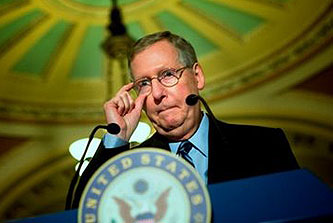 Would you like to know more about what makes Mitch McConnell tick? Zach Carter and Jason Cherkis have you covered with a Brobdingnagian profile of the Senate minority leader in the Huffington Post today. Here’s a taste:
Would you like to know more about what makes Mitch McConnell tick? Zach Carter and Jason Cherkis have you covered with a Brobdingnagian profile of the Senate minority leader in the Huffington Post today. Here’s a taste:
After 30 years in Washington spent fighting Democrats on nearly every front, McConnell has embraced his persona as the dark lord of Capitol Hill. John Yarmuth, the Democratic Kentucky congressman who as a young Republican had traveled with McConnell organizing college campuses for [Marlow Cook’s Senate campaign in 1968], says the two are no longer on speaking terms. “He won’t talk to me now,” Yarmuth says of McConnell. “I’ve known him for 45 years.”
Recently, Yarmuth says, he ran into the Senate minority leader at a largely empty airport VIP room. McConnell was sitting alone with a newspaper. “I looked straight at him,” Yarmuth says. “I said, ‘Hi, Mitch.’ There wasn’t a muscle in his face that moved. … He just buried his head in the paper.”
McConnell’s life has become an endless campaign.
Marlow Cook is disappointed in his former staffer. “When you go to Washington, you make your record,” says the retired former senator. “Nobody else makes it for you. And the record that he has made, he has to be comfortable with or he wouldn’t be there. … A man makes the reputation he gets. Mitch has to be satisfied. If I were there and I were in that position, I would not be satisfied.”
As it happens, I suspect that this piece exaggerates McConnell’s influence. Does he deliver plenty of pork for Kentucky? Yes, but that’s what senators do. Did he help turn Kentucky into a Republican stronghold? Yes again, but that was happening all over the South in the 70s and 80s. McConnell was part of that movement, but I’m not sure he played a uniquely transformative role.
Nonetheless, if you want to understand the forces that made McConnell McConnell, this isn’t a bad place to start. Put aside a half hour one of these days and dive in.


















